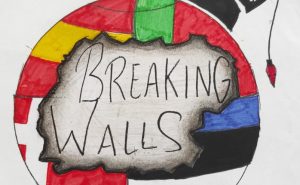European societies are diverse, and so happens inside the educational institutions where there are increasing needs of
inclusion. In our schools it has been perceived that making changes in the use of spaces and methodologies may lead to
a better response of these needs. Our project is proposed as an integrating experience of different cultures, languages
and curriculum areas. All these aspects favour multilingualism as the foundation of union in diversity.
Four educational institutions and their need to favour spaces for inclusion are involved in it:
IES Maria Moliner (Spain), coordinator institution, 492 students . There are linguistic, cultural, educational and social
needs. We have a classroom with 8 students with more special needs that are educated by two teachers and an
educator. These students are included in ordinary groups for some subjects.
Skoerping Skole (Denmark) primary and lower secondary school, placed in the biggest Danish forest, gives unique
opportunities regarding working outdoors. It has 794 students, 65 of them attend the department of special needs.
Tallina Teknikagümnaasium (Estonia) 700 students aged 7 to 19 member of the worldwide network of UNESCO
Associated School, part of the Eco-Schools and the Baltic Sea projects. The school has an active sport-life. They have
students with special needs who are attended at different levels.
AE Madeira Torres (Portugal) is a school cluster with 2,963 students 247 of their students have special learning needs
and some of them attend 3 learning units for pupils with autism spectrum disorder, served by 6 teachers and 7
assistants, sometimes they are integrated in ordinary classrooms.
This project will focus on the management of indoor, outdoor and surrounding spaces, because the main objective will be
to achieve a physical transformation of the available spaces if possible, or transform them with innovative uses and
methodologies that favour the inclusion.
We also want to create a student environment where the student will be able to identify itself as a main character in the
educational community. The student should be autonomous to be able to create empathy with its partners and offer its
help in whatever situation he/she may face and in its own daily life.
We propose activities of:
- Reflection : ” What can we do?”, ” European way”, ” Here and There” .. our students will carry out activities with
partners who face similar situations and needs and and will find the strategies to find some solutions for their institutions
needs - Design and creation of inclusive spaces: ” Steam Corner” : This section will be the box of artistic creation in which
inclusion is always present and the space to learn design software to be used in activities during the mobility. We will
create a photo contest with the title ‘ Spaces and Inclusion’ . This graphic content will be useful to carry out awareness on
inclusion in the surrounding spaces.With a selection of twelve photos a calendar of year 2022 will be edited. - “Sustainable spaces” With this activity each school will carry out team activities where they will study what we are doing
in our surrounding places against climate change. working with the 17 sustainable development goals to transform our
world set by UN. This survey will be included in the section STEAM of the magazine, being the main tool of dissemination
of the project and it is very important to check that is updated regularly and shared by all schools through the platform
eTwinning. ETwinng Myspace will be used for publishing.
We are planning to use eTwinning in the three stages of our project.We will begin using it for introduction and team
working between pupils of four participants..In addtion, to follow-up the project, a digital interactive magazine wil be
inserted during all the project in which we can see its developement and improvement. As an example, we will create a
photo contest with the title ‘ Spaces and Inclusion’ . This graphic content will be useful to carry out awareness on
inclusion in the surrounding spaces.With a selection of twelve photos a calendar of year 2022 will be edited.
The impact of the project is aimed to be towards 3 levels:institutions, people involved in the project and specially students
who are the main target in our project.
The longer term benefits will permit the whole educative community: school, family, environment, town…in terms of: More
effective teaching approach. Core curriculum improvement. More accurate Intercultural perspective of our school.
Motivation improvement. Favour the inclusive learning The improvement to manage indoor and outdoor spaces.
In terms of mobilities (three per institution) this project will involve 72 students and 24 teachers (18 students and 6
teachers per mobility). There is an agreement with the other schools about hosting the students at other students’
homes, so the budget for the mobilities will cover this important number of participants.
This project “2020-1-ES01-KA229-082054” has been funded with support from the European Commission. This publication reflects the views only of the IES María Moliner, and the Commission cannot be held responsible for any use which may be made of the information contained therein.
El proyecto “2020-1-ES01-KA229-082054” está cofinanciado por el programa Erasmus+ de la Unión Europea. El contenido de esta publicación es responsabilidad exclusiva del IES María Moliner y ni la Comisión Europea, ni el Servicio Español para la Internacionalización de la Educación (SEPIE) son responsables del uso que pueda hacerse de la información aquí difundida.
El projecte “ 2020-1-ES01-KA229-082054 ” està cofinançat pel programa Erasmus+ de la Unió Europea. El contingut d’aquesta publicació és responsabilitat exclusiva de l’IES María Moliner i ni la Comissió Europea, ni el Servei Espanyol per a la Internacionalització de l’Educació (SEPIE) són responsables de l’ús que es puga fer de la informació difosa ací.

